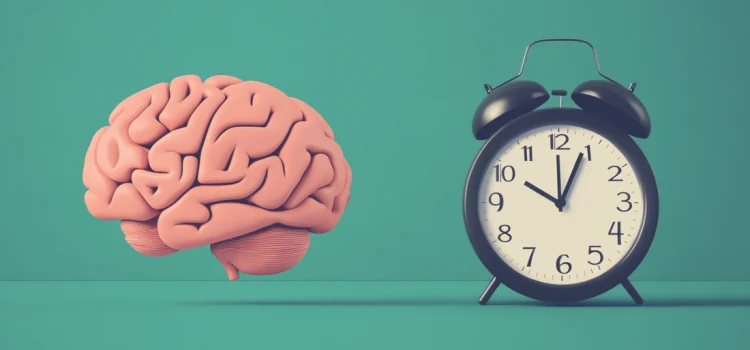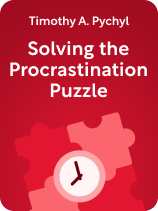

This article is an excerpt from the Shortform book guide to "Solving the Procrastination Puzzle" by Timothy A. Pychyl. Shortform has the world's best summaries and analyses of books you should be reading.
Like this article? Sign up for a free trial here.
What’s the psychology of procrastination? Why are humans ill-equipped to deal with distractions?
One reason we find ourselves procrastinating is that we don’t prepare for even the most obvious things that might go wrong, according to Timothy A. Pychyl. You know yourself and know how you typically behave, but you likely don’t use that information to your advantage.
Check out how that leads to two causes of procrastination.
We Aren’t Prepared to Deal With Distractions
The psychology of procrastination explains that one of the most common obstacles that can throw you off when you work toward a goal is also one of the simplest: distractions. Whether they come in the form of colleagues knocking on your door or push notifications from your favorite social media app, distractions pull your attention away from what you need to do and make it harder for you to make meaningful progress. But as Pychyl notes, you probably don’t prepare yourself to run this gauntlet of interruptions.
What to Do About It:
Pychyl recommends that you start by reducing potential distractions (especially internet-related distractions) before you even sit down to begin work. You might put your smartphone away in a drawer, close all of the windows on your computer except the one you need, and draw your shades.
You might also find it useful to take note of the distractions you face as you’re trying to get work done so you can plan for them. Pychyl recommends observing the points in a task where you tend to give in to distraction. Plan to get past these predictable hurdles by removing the distractions that pull you away from your work or by making a predecision about how you’ll handle these difficult moments. (Shortform note: One way to observe what’s distracting you might be to borrow a meditation technique where you imagine your thoughts as leaves floating on a stream. Each time a thought distracts you, notice it, then place it on a leaf and let it float away. This allows you to practice letting distracting thoughts come and go without having to act on them.)
(Shortform note: Other psychologists agree with Pychyl that having an environment where you can work without distractions or temptations can play a crucial role in helping you avoid procrastination and get work done. In fact, as researchers re-evaluate classic studies with more rigorous methods, they’re finding it’s less important to be good at self-control than to eliminate distractions. The people who seem to be best at self-control are actually those who encounter the fewest temptations that might pull their attention from a task. This suggests that anticipating and eliminating potential distractions, as Pychyl recommends, might help you stay more focused on your work and make you more likely to accomplish what you want to get done.)
We Don’t Recognize Personality Traits That Make Us Likely to Procrastinate
Another obstacle that might stand between you and your goals—and divert you toward procrastination if you don’t prepare for it—is more difficult to change: your personality. Pychyl explains that certain personality traits have been linked to procrastination. Three traits, in particular, seem to have a marked link to higher rates of procrastination: Neuroticism (the tendency to experience negative emotions more than other people), impulsivity (the inclination to make choices without thinking them through fully), and perfectionism (specifically the kind of perfectionism caused by your perception that other people have unrealistically high expectations of your performance).
(Shortform note: While it’s difficult—but not impossible—to change your personality, you can defy your instincts at least temporarily. In a beloved episode of Seinfeld, George Costanza decides to do the opposite of what he’d usually do. He orders something different for lunch, strikes up a conversation with a beautiful woman, and speaks openly about not having a job and living with his parents—which leads to him getting a job and moving out. You don’t need to change who you are to change how you behave. But experts say there’s a tool you can use to be a little less neurotic, impulsive, or perfectionistic: mindfulness. By becoming more aware of what you’re thinking and feeling, you can decide more intentionally how you want to respond.)
What to Do About It:
While you could try to change your personality, that’s not the strategy that Pychyl recommends. Instead, he advises that you pay attention to the traits you have and how they prompt you to respond in your usual way (that is, how they make you prone to procrastination). Then, you can decide how to change that response. For example, you can counter the perfectionism that arises from thinking your boss won’t accept anything except brilliant ideas by learning to remind yourself that all ideas are welcomed and valued at your team’s meetings.
(Shortform note: In addition to finding that certain personality traits seem to correlate with procrastination, researchers have found likely links with some other common traits. For example, people with attention-deficit/hyperactivity disorder (ADHD) tend to procrastinate as a way to put off tasks that feel overwhelming, either because they don’t know how to get started or because they keep getting distracted. Experts say that people with more severe ADHD symptoms are more likely to experience depression and anxiety linked to their procrastination. But dividing tasks into small pieces, using a reward for motivation, and limiting distractions can help people with ADHD learn to procrastinate less.)
Whether or not you have personality traits linked to procrastination, Pychyl emphasizes that you can’t rely solely on willpower to overcome it. He explains that willpower is limited, and it’s much more effective to make realistic plans to curb your procrastination than to assume you can change through sheer force of will. But when you know you’ll need to rely on willpower, Pychyl recommends preparing by getting enough sleep, spending time with people who give you energy, and not relying on willpower at the end of the day when you’re tired.
(Shortform note: For decades, psychologists subscribed to a theory called “ego depletion,” which says willpower is a finite resource, as Pychyl suggests. As detailed in Roy Baumeister and Jon Tierney’s Willpower, hundreds of studies seem to show that cognitive effort draws down our reserve of willpower. But experts have discovered major flaws in the research, and it’s possible the effect isn’t real at all. Indistractable author Nir Eyal explains it looks like willpower is more like an emotion: Emotions come and go and take effort to manage. Willpower is also a challenge. But if you accept that you’ll struggle with it from time to time, you can learn from your mistakes—and realize your procrastination habit will probably always be a work in progress.)

———End of Preview———
Like what you just read? Read the rest of the world's best book summary and analysis of Timothy A. Pychyl's "Solving the Procrastination Puzzle" at Shortform.
Here's what you'll find in our full Solving the Procrastination Puzzle summary:
- The real reason why you procrastinate
- How procrastination undermines your ability to live a happy, healthy life
- Practical advice for changing your relationship with your most dreaded tasks






